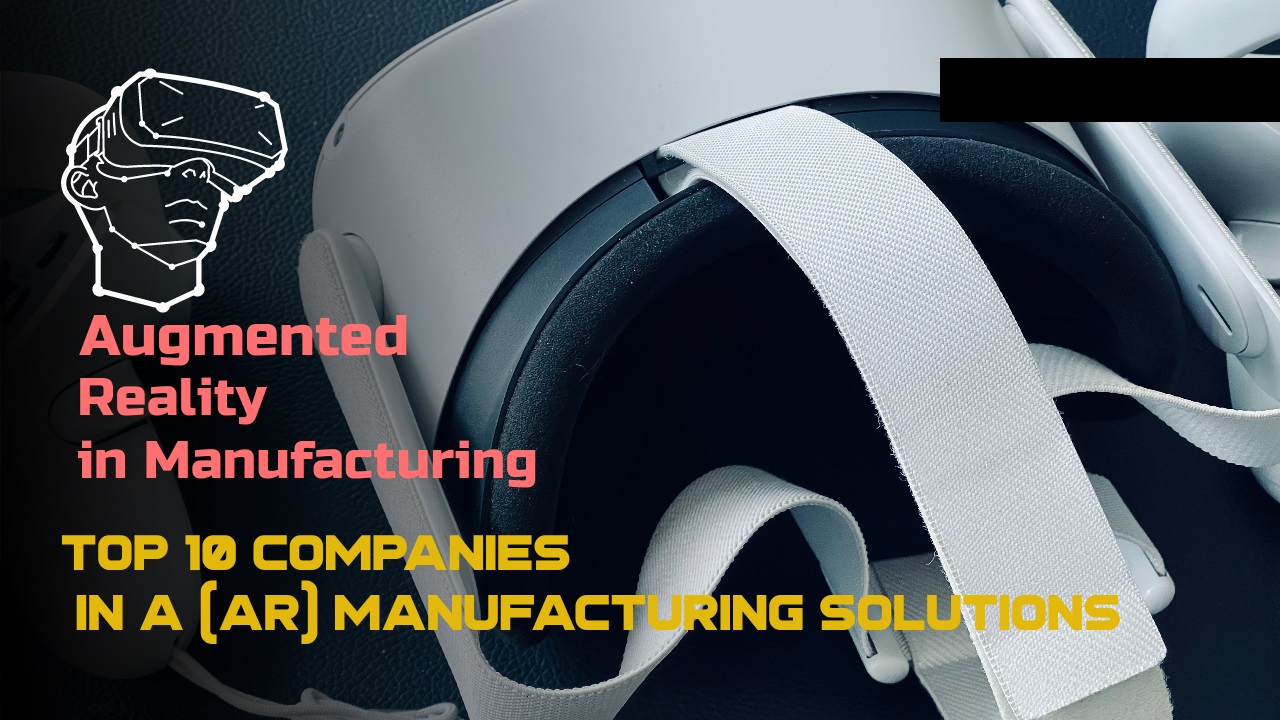Augmented Reality in Manufacturing: A 5-Year Roadmap and Comprehensive Analysis
Introduction:
Augmented Reality (AR) has become a game-changing technology in the manufacturing industry, completely transforming production processes and significantly improving overall operational efficiency. In this comprehensive article, we will explore the role of AR in manufacturing, its future predictions, and provide a detailed comparison of the top 10 companies offering AR solutions. Additionally, we will address frequently asked questions to deliver high-quality, engaging, and SEO-optimized content. Let’s dive into the roadmap for the next five years, examine the global impact of AR in manufacturing, and analyze the performance of these 10 companies.

Table of Contents:
Augmented Reality in Manufacturing: Revolutionizing the Industry
Future Predictions for AR in Manufacturing
5-Year Roadmap for Augmented Reality in Manufacturing
Comparison of the Top 10 Companies in AR Manufacturing Solutions
Merits and Demerits of Augmented Reality in Manufacturing
Frequently Asked Questions (FAQs) about AR in Manufacturing
Augmented Reality in Manufacturing: A 5-Year Roadmap and Comprehensive Analysis
Augmented Reality in Manufacturing: Revolutionizing the Industry
Augmented Reality is transforming the manufacturing industry by seamlessly blending virtual elements with the physical environment. Manufacturers are leveraging AR to enhance production processes, improve training programs, increase productivity, and minimize errors. AR technology allows workers to access real-time information, overlay digital instructions, and visualize complex data, leading to improved operational efficiency and reduced downtime.
Future Predictions for AR in Manufacturing
The future of AR in manufacturing is promising, with significant advancements expected in the coming years. AR is likely to become more integrated into manufacturing workflows, enabling real-time collaboration, remote assistance, and predictive maintenance. As technology evolves, we can anticipate increased adoption of AR glasses, wearable devices, and mobile applications in manufacturing environments.
5-Year Roadmap for Augmented Reality in Manufacturing
Over the next five years, the roadmap for AR in manufacturing focuses on the following key areas:
a) Technology Advancements:
Continuous improvement of AR hardware and software to provide more immersive and realistic experiences. Advancements in gesture recognition, spatial mapping, and object recognition will further enhance usability and accuracy.
b) Integration with IoT and AI:
AR will be integrated with the Internet of Things (IoT) and Artificial Intelligence (AI) technologies, enabling seamless connectivity between physical devices, data analysis, and autonomous decision-making in manufacturing processes.
c) Enhanced Training and Onboarding:
AR-based training modules will become more prevalent, enabling efficient onboarding of new employees, upskilling existing workers, and reducing training costs. Interactive simulations and step-by-step instructions will improve learning outcomes.
d) Remote Assistance and Collaboration:
AR will facilitate remote assistance, allowing experts to guide technicians in real time, regardless of their physical location. This will expedite problem-solving, reduce travel costs, and enhance collaboration among teams.
e) Predictive Maintenance:
AR solutions will integrate predictive maintenance capabilities, leveraging real-time data and machine learning algorithms to identify and prevent equipment failures, thereby reducing downtime and optimizing maintenance schedules.
Comparison of the Top 10 Companies in AR Manufacturing Solutions
In this section, we will compare the top 10 companies offering AR solutions for manufacturing. The comparison will assess factors such as technological capabilities, product offerings, customer satisfaction, industry experience, pricing models, and integration capabilities. Let’s analyze the strengths and weaknesses of these companies to assist manufacturers in selecting the most suitable AR solution provider.
Limited compatibility with certain manufacturing systems.
Merits and Demerits of Augmented Reality in Manufacturing
Augmented Reality offers several advantages for the manufacturing industry, including:
Increased productivity and efficiency through real-time data visualization and guidance.
Improved worker training and onboarding processes through interactive and immersive experiences.
Enhanced quality control and error reduction by overlaying digital instructions and highlighting potential issues.
Streamlined maintenance and repair processes through remote assistance and predictive maintenance capabilities.
Advantages:
Robust AR hardware and software solutions for manufacturing environments.
Extensive experience in the industry with a proven track record of successful implementations.
Strong customer support and reliable after-sales service.
Disadvantages:
Higher upfront costs compared to some competitors.
However, there are a few challenges and limitations to consider:
High initial investment costs for implementing AR solutions.
Integration complexities with existing manufacturing systems and processes.
Adoption barriers due to the need for specialized training and change management.
Security and privacy concerns regarding sensitive manufacturing data.
Top 10 Companies in Augmented Reality (AR) Manufacturing Solutions: A Comprehensive Comparison
Intel
Location: Santa Clara, California, USA
Website: www.intel.com
Intel is a global technology leader and a key player in the AR manufacturing sector. Their innovative solutions encompass AR hardware, software, and development tools. Intel’s AR technology empowers manufacturers with real-time data visualization, remote assistance, and process optimization capabilities. Their commitment to advancing AR technology has made them a reliable partner for manufacturers seeking cutting-edge solutions.
Metaverse VR
Location: San Francisco, California, USA
Website: www.metaversevr.io
Metaverse VR focuses on providing immersive AR experiences for manufacturing. Their solutions enable workers to interact with virtual objects, access digital instructions, and collaborate in real time. With Metaverse VR, manufacturers can enhance assembly line operations, improve training efficiency, and streamline complex tasks. Their user-friendly platforms have gained recognition for their seamless integration and intuitive interfaces.
Immerse VR
Location: London, United Kingdom
Website: www.immerse.io
Immerse VR offers AR solutions tailored to the manufacturing industry. Their platform provides realistic virtual environments for training, simulations, and data visualization. Immerse VR’s technology enhances employee onboarding, reduces errors, and improves safety protocols. Manufacturers benefit from their expertise in creating immersive and interactive experiences that optimize production processes and enhance workforce productivity.
Nvidia
Location: Santa Clara, California, USA
Website: www.nvidia.com
Nvidia is renowned for its graphics processing units (GPUs) and their impact on AR in manufacturing. Their powerful hardware accelerates AR rendering and enables high-quality visualizations. Nvidia’s AR solutions enhance design processes, improve product simulations, and facilitate collaborative virtual prototyping. Their advanced GPU technology continues to push the boundaries of AR capabilities in the manufacturing sector.
Amazon Sumerian
Location: Seattle, Washington, USA
Website: aws.amazon.com/sumerian
Amazon Sumerian offers a comprehensive AR platform for manufacturing. Their solutions enable companies to create interactive AR experiences without the need for extensive programming knowledge. With Amazon Sumerian, manufacturers can develop virtual showrooms, product visualizations, and interactive training modules. Their cloud-based infrastructure ensures scalability and easy deployment across multiple devices.
Zebrar
Location:
Sydney Australia
Suite 201 B, 90-96 Bourke Road, Alexandria 2015
Website: www.zebrar.com
Zebrar specializes in AR solutions for industrial maintenance and assembly operations. Their technology combines AR with computer vision and machine learning, allowing for real-time object recognition, remote assistance, and predictive maintenance capabilities. Zebrar’s solutions improve operational efficiency, reduce downtime, and empower workers with contextual information for accurate decision-making.
Wevr
Location: Venice, California
Website: www.wevr.com
Krea VR focuses on delivering immersive AR experiences for manufacturing and industrial training. Their solutions offer realistic simulations, interactive modules, and virtual prototyping capabilities. Krea VR’s technology enhances employee skills development, improves safety awareness, and optimizes manufacturing processes. Their commitment to innovation has positioned them as a prominent player in the AR manufacturing landscape.
XR Central
Location: Seattle, Washington, USA
Website: www.xrcentral.com
XR Central provides end-to-end AR solutions for manufacturing, encompassing design, training, and maintenance. Their platform enables manufacturers to create 3D visualizations, interactive manuals, and real-time collaboration tools. XR Central’s technology streamlines workflows reduces errors, and enhances operational efficiency. Their user-friendly interface and customization options cater to the specific needs of manufacturing companies.
Flash VR
Location: Berlin, Germany
Website: www.f6s.com
Flash VR specializes in AR solutions for industrial maintenance and repair. Their technology utilizes AR overlays, IoT integration, and remote assistance capabilities to enable real-time guidance and troubleshooting. Fluxus’ solutions improve equipment uptime, reduce maintenance costs, and provide workers with accurate information at the point of need. Their focus on practical applications has garnered attention in the manufacturing industry.
Qualcomm
Location: San Diego, California, USA
Website: www.qualcomm.com
Qualcomm, a leading semiconductor and telecommunications company, plays a significant role in advancing AR technology for manufacturing. Their high-performance processors and wireless communication solutions facilitate seamless AR experiences. Qualcomm’s technology enables manufacturers to leverage real-time data, improve supply chain visibility, and enhance worker productivity. Their commitment to driving innovation makes them a key player in the AR manufacturing sector.
Verdict:-
The top 10 companies in AR in manufacturing solutions are revolutionizing the industry with their unique contributions. Each company brings its expertise and innovative solutions to address specific manufacturing challenges. From real-time data visualization and immersive training experiences to remote assistance and predictive maintenance capabilities, these companies are shaping the future of AR in manufacturing. By leveraging their offerings, manufacturers can optimize operations, enhance productivity, and unlock new levels of efficiency in their manufacturing processes.
Frequently Asked Questions (FAQs) about AR in Manufacturing
Q1: How does Augmented Reality improve worker safety in manufacturing?
A1: AR can enhance worker safety by providing real-time visual cues and alerts, guiding workers to take precautionary measures, and identifying potential hazards in the manufacturing environment.
Q2: Can AR solutions be customized for specific manufacturing needs?
A2: Absolutely! AR solutions can be tailored to meet the unique requirements of different manufacturing processes and industries. This customization ensures that the integration of AR technology is seamless and optimized for maximum effectiveness.
Q3: How does AR impact the training and onboarding of manufacturing employees?
A3: AR brings a whole new level of training and onboarding experiences for manufacturing employees. It enables interactive and immersive training sessions where employees can learn complex procedures and operations in a safe virtual environment. This accelerates the onboarding process, reduces the learning curve, and helps workers become proficient faster.
Q4: Which manufacturing tasks can benefit from AR?
A4: AR can benefit a wide range of manufacturing tasks. It can improve assembly line operations by providing real-time guidance and overlaying digital instructions, resulting in fewer errors and faster production. AR is also valuable for equipment maintenance and repair, as it offers step-by-step visualizations and real-time data for increased efficiency and reduced downtime. Quality control inspections, inventory management, and supply chain optimization are other areas where AR can provide significant benefits.
Q5: What are the data security considerations when implementing AR in manufacturing?
A5: Implementing AR in manufacturing requires robust data security measures to safeguard sensitive information. Companies must ensure secure transmission and storage of data, control access permissions, and comply with relevant privacy regulations. By prioritizing data security, manufacturers can protect their proprietary and confidential information.
Conclusion:
Augmented Reality has the potential to revolutionize the manufacturing industry by boosting productivity, improving training processes, and enhancing maintenance operations. With a clear roadmap for the next five years, the future of AR in manufacturing looks promising. By conducting a thorough analysis of the top 10 companies in the field, manufacturers can make well-informed decisions when selecting an AR solution provider. Embracing AR technology will pave the way for a more efficient, connected, and innovative manufacturing landscape.
Also Read:-

Reviews